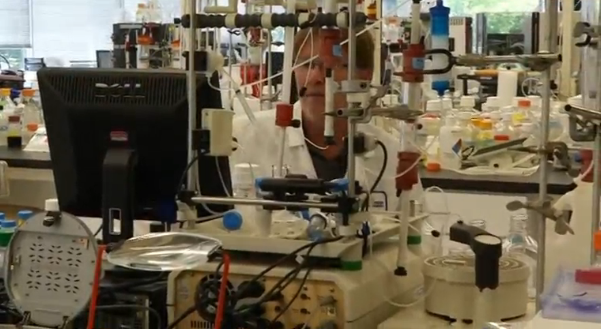
(Reuters) — The race to develop a vaccine and successfully test and immunize people against the Zika virus continues.
Connecticut-based Protein Science Corporation is one of several companies in pre-clinical stages, developing and manufacturing a Zika vaccine for review by the U.S. Food and Drug Administration.
The vaccine is based on production of recombinant variations of the E protein from the Zika virus. The production process is based on an FDA approved process for the company’s Flublok influenza vaccine, the only FDA approved recombinant influenza vaccine on the market.
“We are basically using the technology that we developed for our flu vaccine to make a Zika vaccine and the big advantage of that is that we can rapidly develop that Zika vaccine,” explained CEO Manon Cox.
The biggest difference between this vaccine and others in development is that since it’s protein based, it is not a live attenuated vaccine. A DNA vaccine is also in development that researchers reported successfully blocked the disease in mice. However, DNA vaccines have been in development for 25 years and have never been approved by the FDA.
Cox said researchers will be producing clinical material to submit to the FDA this week, which will be tested first in toxicity studies and then in clinical trials.
The Zika virus, which has swept through the Americas and the Caribbean since last fall, has been linked to thousands of cases of microcephaly, a rare birth defect, in Brazil, as well as to neurological disorders. It has been declared a global health emergency by the World Health Organization.
“We hope to begin clinical studies as soon as the FDA allows us but it looks like they want to see repeat toxicity studies in animals and those might take almost 3 months. So that means by the time November comes we could be in clinical studies,” Cox explained.
Protein Sciences, which began work on the vaccine in February, has partnered with Sinergium Biotech on the vaccine and is receiving assistance from international foundations as well as the NIH.
The NIH has not yet offered funding, but Cox says they are making resources available to the company.
So far, there have not yet been any cases reported of local transmission of the Zika virus in the continental United States, but there have been 820 cases that were acquired from travel to areas with active Zika outbreaks, or through sexual transmission. There have been more than 1,800 cases of Zika infection reported in Puerto Rico, a U.S. territory in the Caribbean.
Health experts expect local transmission to occur in the continental United States with warmer weather.
Cox explained that health officials will be closely monitoring the cases in Puerto Rico.
“If it turns out that the occurrence of birth defects are not as high as appears to be in Brazil then the FDA will probably take their usual process and it will take probably two to three years before we will have a vaccine in our hand. Would the situation become far more urgent, then they could act much more quickly and provide licenses under an emergency use authorization. And that would mean they could do it in a year’s time.”
Even if a Zika vaccine were to be designated under the emergency use authorization such as the Ebola vaccine was, researchers say there are significant hurdles ahead.
“From identifying the disease to making a vaccine that go and be tested in humans usually takes around a year if everything goes fine. And The problem is that one year from now there may not be so many cases of Zika virus infections making it very challenging to test the vaccine,” explains Professor Adolfo Garcia-Sastre, the director of the Global Health and Emerging Pathogens Institute at Mt.Sinai in New York.
Garcia-Sastre said this situation is not uncommon, and occurred as recently as 2009, when an influenza pandemic spread across the U.S. He explained that by the time a vaccine was developed, people were no longer being infected with that particular strain of influenza, so it was difficult to test the vaccine’s efficacy.
At least 15 companies and academic groups are racing to develop Zika vaccines, according to the WHO. U.S. vaccine maker Inovio Pharmaceuticals last week got U.S. Food and Drug Administration approval to begin testing its Zika DNA vaccine in humans.








